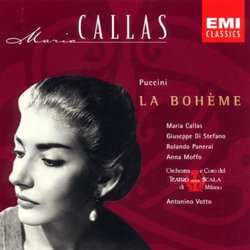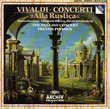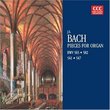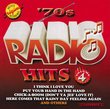| All Artists: Maria Callas Title: La Boheme (Highlights) Members Wishing: 0 Total Copies: 1 Label: EMI Classics Release Date: 6/2/1998 Genre: Classical Styles: Opera & Classical Vocal, Historical Periods, Modern, 20th, & 21st Century Number of Discs: 1 SwapaCD Credits: 1 UPC: 724356667020 |
Search - Maria Callas :: La Boheme (Highlights)
 | Maria Callas La Boheme (Highlights) Genre: Classical
![header=[] body=[This CD is available to be requested as disc only.]](/images/attributes/disc.png?v=a4e11020) ![header=[] body=[This CD is available to be requested with the disc and back insert.]](/images/attributes/disc_back.png?v=a4e11020) ![header=[] body=[This CD is available to be requested with the disc and front insert.]](/images/attributes/disc_front.png?v=a4e11020) ![header=[] body=[This CD is available to be requested with the disc, front and back inserts.]](/images/attributes/disc_front_back.png?v=a4e11020) |
Larger Image |
CD DetailsSimilar CDs
|
CD ReviewsCallas and Mimi and La Boheme Steven A. Peterson | Hershey, PA (Born in Kewanee, IL) | 07/01/2008 (5 out of 5 stars) ""La Boheme" is one of the most bewitching of operas, with its smooth lines, poignant libretto, and sheer musicality. One of Puccini's masterpieces, of course. This is the version featuring Maria Callas as Mimi, supported by a fine cast. Giuseppe sang Rodolfo, Rolando Panerai took the role of Marcello, and Anna Moffo sang Musetta. I was surprised to find from the liner notes that Callas never sang Mimi in an opera house. The La Scala Orchestra performs well under the baton of Antonino Votto.
The key to whether or not "La Boheme" satisfies, needless to say, is the quality of the singing and orchestral support. This is a highlights version, but it captures many of the most effecting moments. The CD begins with the three interlinked arias--"Che Gelida Manina," "Si, Mi Chiamano Mimi," and "O Soave Fanciulla." Di Stefano begins, as Rodolfo sings of who he is, enchanted with Mimi, who has a room in his apartment building. Di Stefano was a fine tenor of his day and sings well here. He sometimes exhibited annoying affectations (and there are a handful here), but these do not diminish from his performance. He hits the heroic notes on "Qui son" and "La spreranza" pretty much dead on. Overall, handsomely sung. There follows Mimi's response, in "Si, mi chiamano Mimi." Callas is in very good voice here. She was one of the best acting sopranos of her era, hands down. This is poignantly sung, and--maybe I'm romanticizing--she actually creates a characterization of Mimi. I believe one gets a sense of Mimi the person from her singing. Then, the wonderful duet, "O Soave Fanciulla." Di Stefano begins well, providing some emotion; when Mimi joins in, goose bumps formed on my arms, so special was the moment. A few others make magic (for instance, Gedda and Freni), but it is not automatic. The emotion moves in an ascending arc until the satisfying conclusion, the dual high notes from Rodolfo and Mimi. And then to Café Momus, where Anna Moffo, her voice in its glorious youthful richness, sings Musetta's Waltz, "Quando m'en Vo." She sings this well, with the Bohemians and crowd at the Café joining in as the scene progresses. An enchanting ensemble scene with immense energy as it develops. Lots of fun! The last cut that I will describe is from Act IV, a duet between Rodolfo and Marcello as they speak of their lost loves--Rodolfo and Mimi, Marcello and Musetta. The scene is enjoyable and poignant at the same time. Di Stefano and Panerai sing well and expressively. All in all, one of the more interesting recorded versions of "La Boheme." Rich and musical. Callas in good voice. Interested in a highlights version of the opera? This is a pretty good choice. " |

 Track Listings (10) - Disc #1
Track Listings (10) - Disc #1
![Tchaikovsky: Swan Lake [Hybrid SACD]](https://nationalbookswap.com/cd//m/52/7552/6117552.jpg)

